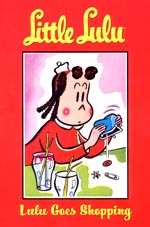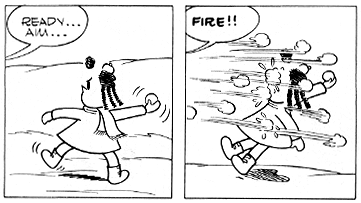 Written by John Stanley
Written by John Stanley
Art by John Stanley and Irving Tripp
128 pages, black and white
Published by Dark Horse
I have a confession to make, and for some comics readers it’s probably pretty unforgivable. Up until this year, I’d never read John Stanley’s critically acclaimed Little Lulu comics. Oh sure, I knew who the character was, and that Stanley’s work on the character was reportedly fantastic. For whatever reason, though, the comics never made their way in front of me. Now that I’ve read the first of Dark Horse’s Little Lulu reprints, though, I’m definitely going to be fixing this rather unfortunate gap in my comic-reading knowledge.
Lulu’s life is certainly never dull. When she’s not running errands for her mother, telling stories to Alvin, or pulling one over her friend Tubby’s “no girls allowed” club, she’s getting into snowball fights, rowing across the lake, and searching for hidden treasures. Well, not all at once, but really, it wouldn’t be that surprising if she did.
What struck me the most about Little Lulu, almost instantly, was how very smartly written Stanley’s stories were. Entertainment aimed primarily at children is often dumbed down, underestimating the intelligence of its audience. That’s certainly not the case with Little Lulu, which assumes that its readers will understand its jokes without labored exposition or set-ups. The jokes are funny, too, which helps a great deal. A prime example is “The Snowball War”, where Lulu and the other girls team up to take down the boys and their supposedly invincible snow fort. Every twist and turn as the teams gain and lose ground is smartly set up and followed through, and by the time it’s over you can’t help but laugh at the outcome. Lulu’s a clever heroine, and it’s a real joy to watch her have to figure out everything from getting her father’s suit back from a homeless man to getting revenge on the boys when they sail to Wigwam Island without her. Best of all, the stories never got tired or predictable (well, with the exception of the occasional appearance of a “Lulu tells Alvin a story” short, but the stories themselves are fun even if the device crops up a little too often) and you genuinely want to read more.
 Stanley and Irving Tripp have a simple art style in Little Lulu that works really well. The focus of Little Lulu should to some extent never be the art itself, but the action that it’s bringing across on the page. What caught my attention was how many panels Stanley would place on the page; the pages with the least number of panels usually contain eight, while others have as many as twelve panels on a single page. It’s almost essential to Stanley’s stories to have the art so compact, since Little Lulu reads very quickly as one thing happens after another in rapid succession. The art itself is cute, with Lulu’s pointy little nose and pom-poms of hair on the top of her head. Visual gags like Lulu wearing a fake mustache work perfectly under Tripp’s direction, and the entire package ends up looking really well put together.
Stanley and Irving Tripp have a simple art style in Little Lulu that works really well. The focus of Little Lulu should to some extent never be the art itself, but the action that it’s bringing across on the page. What caught my attention was how many panels Stanley would place on the page; the pages with the least number of panels usually contain eight, while others have as many as twelve panels on a single page. It’s almost essential to Stanley’s stories to have the art so compact, since Little Lulu reads very quickly as one thing happens after another in rapid succession. The art itself is cute, with Lulu’s pointy little nose and pom-poms of hair on the top of her head. Visual gags like Lulu wearing a fake mustache work perfectly under Tripp’s direction, and the entire package ends up looking really well put together.
Little Lulu: Lulu Goes Shopping is fantastic, and I can’t believe that these stories have been out of print for so long. This is a great way to kick off the new year, with a comic that’s a joy to read and will remind you that there’s a lot of great material out there that you haven’t encountered yet. Dark Horse has additional reprints of Little Lulu planned, and I for one plan on reading them all. Now if future volumes would only include a credits box for the collection (I had to read the introduction to figure out that Stanley wrote and provided layouts for Little Lulu while Tripp provided the finished art), they’d be perfect. Even without, though, this is still a great first volume. Well done.
Purchase Links:
